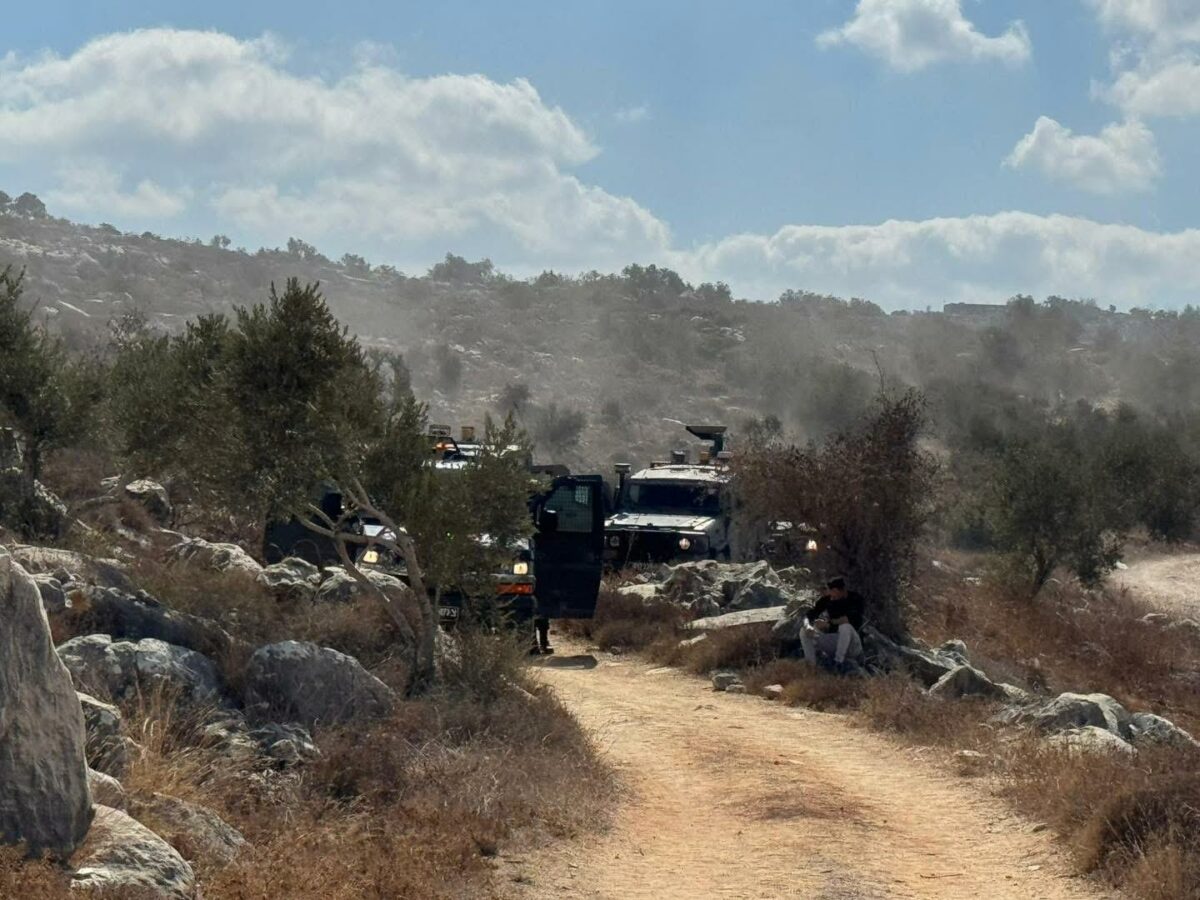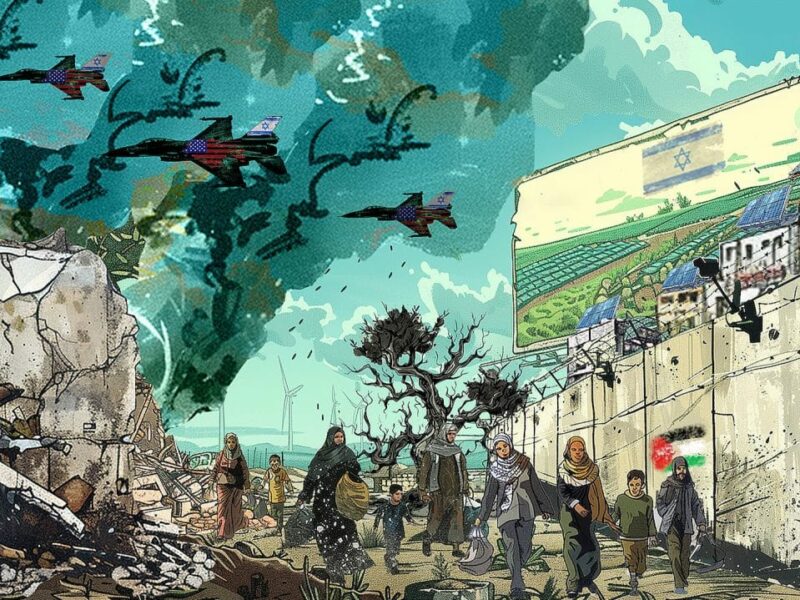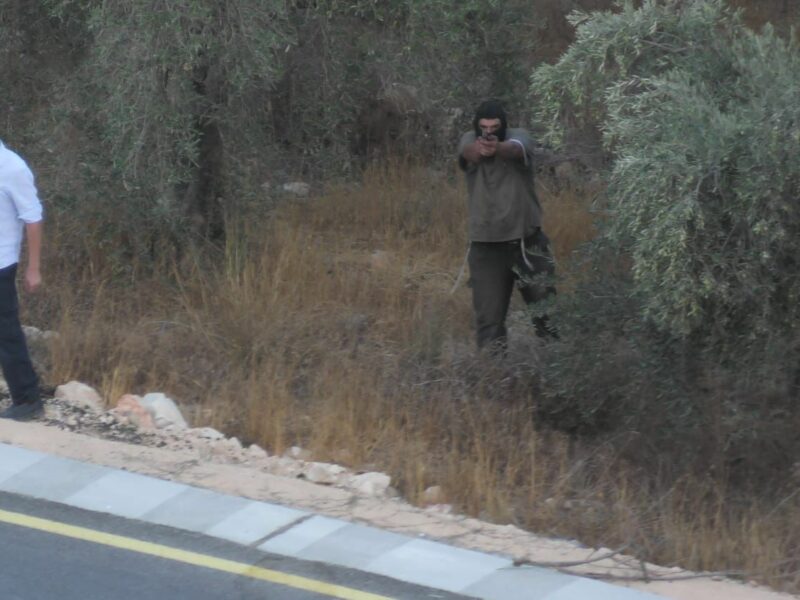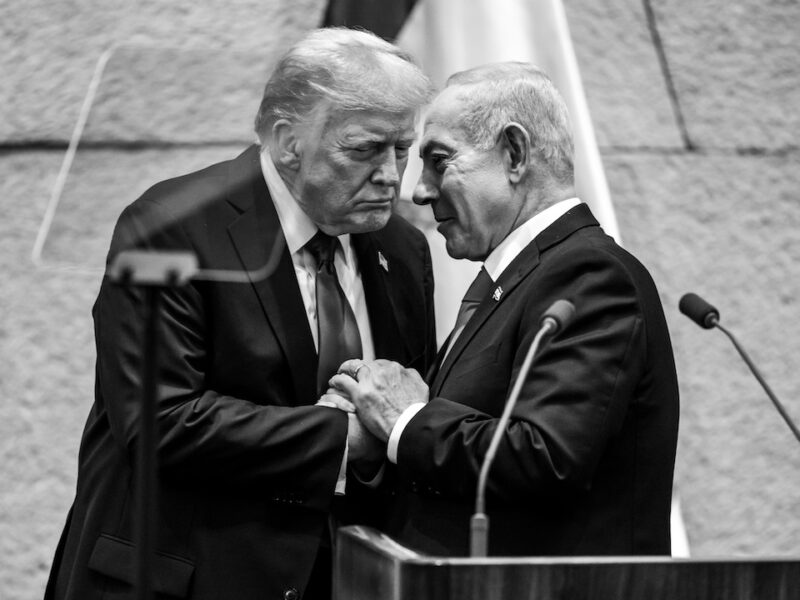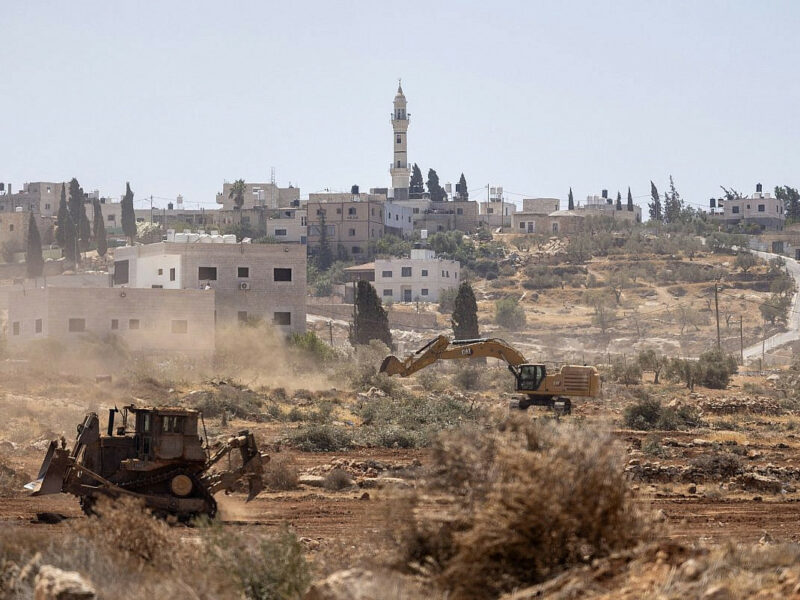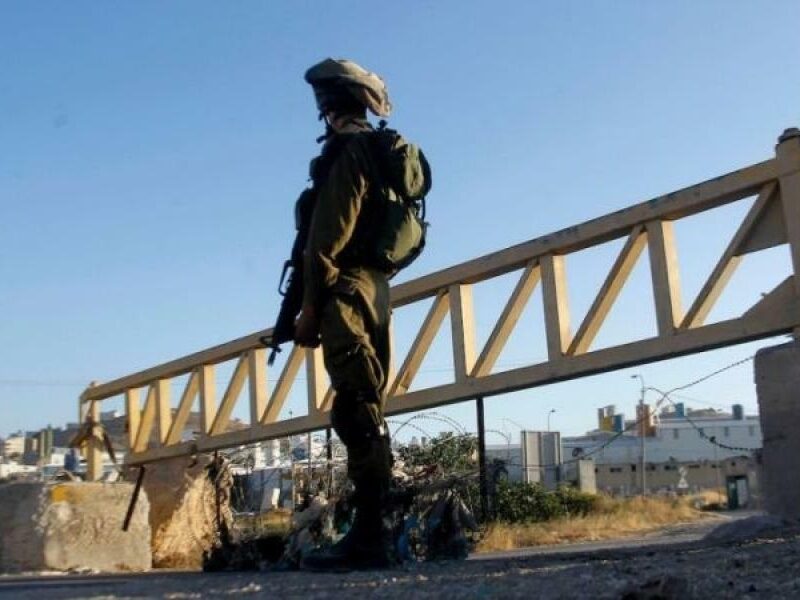The Right to Land
Controlling land and territory
The Palestinian struggle is essentially a struggle to regain self-determination on their ancestral land.
The struggle over the land is therefore been fought as a struggle for sovereignty against annexation and occupation and as a struggle for ownership and access against confiscation. Israel as a state, military force and legislator pits itself against Palestinians that are denied their collective rights as a people and their individual rights as owners.
Land under settler-colonialism
Israel’s settler-colonial project of conquest of land is based on the white supremacist logic that simply ignores the existence and rights of the indigenous population. As late as 1969, the then Prime Minster of Israel Golda Meir affirmed that Palestinians as a people simply did not exist. Yet, the land was and remains the land of the Palestinian indigenous people.
Israel’s effort to take control of the land therefore is threefold: (1) drive as many Palestinians as possible off their lands (2) ensure that the remaining Palestinians are not considered as part of a people but, if anything, as individualized private owners (3) develop means to ‘legally’ declare ownership and finally sovereignty over the land.
Israel’s drive to take as much land with as few Palestinians as possible starts at the very onset of the creation of the state of Israel. Following a massive drive of ethnic cleansing of the Palestinian population, Israel has put in place a system of laws to claim control over most of the land and continued to infringe on the land rights of the remaining Palestinian population with Israeli citizenship. As a result, today roughly 93 percent of the land within the Green Line is exclusively for use by Jewish citizens.
Immediately after the occupation of the West Bank and Gaza, Israel has developed similar schemes based on military orders and legal procedures to dispossess the Palestinian people living there of their territory and land. Some areas are simply declared a ‘firing zone’ for the use of the military or ‘natural reserves’. The most common method Israel uses in order to confiscate land is to declare it state land. Some 16 percent of the West Bank land have been declared ‘state land’ and confiscated through this scheme. Lands that have remained uncultivated for three consecutive years can be claimed as ‘state lands’. By restricting Palestinians’ access to their lands located in the so-called Area ‘C’, where many cannot cultivate their lands for years, Israel systematically facilitates the seizure of more Palestinian lands through this law. Lands to which no Palestinian can bring proof of private ownership that is deemed acceptable by Israeli courts can as well be registered as ownership of the state. A large swath of lands has been confiscated for the construction of Israel’s apartheid Wall and other settlement infrastructure under the excuse of ‘military needs.’ Lands that were owned by Palestinians that fled their lands during or after the occupation in 1967 can as well be considered ‘absentee property’ and confiscated.
Underlying the entire process is a territorial ideology and practices that have been constitutive of the Israeli state since its foundation. It uses a settler scheme of laws and military orders that denies collective ownership and a national project – the fundamental right to self-determination. Yet, it is the only system available to Palestinians, who have to defend their lands not as part of a national struggle but as private owners.
Israel’s system of land appropriation has created what Paul Kohlbry calls destructive inclusion:
“First, the Israeli state mediates forms of market dependency that shape how Palestinian land is used, who uses it, and what sorts of rights and obligations these users have to one another. Second, Israeli land confiscations and acquisitions force Palestinians into the Israeli legal system. The law demands an answer to a deceptively simple question: “who owns this plot of land?” Palestinians must answer by constantly establishing private ownership in ways acceptable to settler law. These modes of inclusion break down rural political economies and social relations. They atomize individual owners and subject them to impossible thresholds of evidence. And they threaten to reduce the national struggle to a problem of property ownership.”
Israeli settler colonialism appropriates Palestinian land and molds landscape to suit its purposes. The long-term effects of settler colonialism in these same areas – access to markets, land, transportation and basic infrastructure – have severely affected the material conditions that allow communities to persist on the land. Moreover, the shift of the Palestinian Authority toward neoliberal technocracy and the effective abandonment of communities superfluous to the current interests of the Palestinian capitalist class has reinforced the process of geographical isolation, material deterioration and political atomization of these communities.
Land under apartheid
Apartheid is a very particular version of settler-colonialism that superimposes itself since the beginning of the struggle of the Palestinian people for land.
The attempt to drive Palestinians into fragmented, racially segregated reserves and South Africa-style Bantustans is part of Israel’s plans for the conquest and confiscation of land.
It was the Oslo Accords that drew this land scheme for the first time officially on the map. Through these Accords, the occupied Palestinians territories have been designated as Area A (Palestinian civil control, residential areas), Area B (mixed control), Area C ( full Israeli control, rural areas and grazing lands, including most water reserves). Area C makes up over 60 percent of the West Bank and is home to an estimated 300,000 Palestinians, living in about 530 residential areas that are partially or entirely located in this area. Far from being a scheme for gradual restitution of ‘sovereignty’ over the territory, Israel escalated its effort to colonize the lands and take ownership and deny Palestinian access to most of Area C.
The construction of the apartheid Wall, the isolation of the lands behind it and the enclosure of Palestinians behind up to 8-meter-high cement walls are a culmination of this process of land take over.
Palestinian farmers and Bedouin herder communities that are being dispossessed by this land theft are then often exploited as cheap labour in Israeli industries, whether in the settlements or across the Green Line.
The reality on the ground
Mount Al-Arma: Taking over hilltops

Mount Al-Arma overlooks the Jordan Valley and has been last year a site where illegal settlers attempted to take over land. The settlers’ attacks have come as a response to a call published on social media by settlers living in Itamar illegal settlement to seize control over the land. They claim it to be an ancient religious site for Jews. Invoking presumed religious or archaeological value is a common tool to sanction attempts to strip Palestinians of their land.
Mount Al-Arma’s importance does not lie in the claimed religious meaning assigned to it, but in its strategic location. Mount Al-Arma overlooks the Jordan Valley, a fertile land threatened with imminent de jure annexation. Seizing this hilltop represents a panoptical defensive tool as it would grant the Israeli occupation with a panoramic view over the Jordan Valley and the whole district of Nablus.
Palestinians staged a protest sit-in on the hill and faced heavy repression by the Israeli military. A Palestinian teen, Muhammad Hamayel, was killed by Israeli military at the sit-in. Despite this Palestinians kept steadfast and finally were able to thwart the attack on Mount Arma.
Walls, settlements and roads

Construction of infrastructure, whether that straight forward a wall, or settlement urban areas or related infrastructure such as roads, is a key element for confiscation and annexation. Not only are these structures in themselves built on Palestinian land, the area around them, will be off-limits for military needs and in many cases the area that Palestinians effectively are unable to access because they are simply cut off from it or because they fear settler attacks is much vaster than that.
At the same time, this infrastructure creates a new reality where Israel cements its claim to sovereignty over the land.
Israel’s apartheid road around Jerusalem, which simultaneously isolates the Palestinian town of Anata from Jerusalem, confiscated land and facilitates Israel’s illegal settlement enterprise is a prime example for this.
Dispossessed and exploited

South of the city of Tulkarem, the Israeli occupation has announced in 2020 its plan to seize over 800 dunums belonging to Palestinians living in the villages of Shufa, Khirbet Jabara and Al-Ra’s. On the seized lands the Israeli occupation plans to build a new settlement industrial zone. Suhail Salman, a grassroots activist from Tulkarm explains:
“The Israeli government seeks to realize more than one goal through the construction of an industrial zone in the area. Firstly, the settlement industrial zone would isolate the southern villages falling within the district of Tulkarm known as the Al-Kafriyyat villages from the Tulkarm governorate. Secondly, the main street connecting the city of Tulkarm with the Al-Kafriyyat villages and the governorate of Qalqilya will become part of the settlement industrial zone. This means that to go to Qalqilya or the Al-Kafriyyat villages, people from Tulkarm need to pass through Nablus and other towns, a one-hour and a quarter long journey while it now takes few minutes to reach the Kafriyyat villages. Thirdly, the construction of industrial zones in Tulkarm and other parts of the West Bank is a mechanism to usurp more land and pillage more natural resources belonging to Palestinians, which will only benefit the illegal Israeli settlers and employers who settle in the stolen Palestinian lands. Forth, the industrial zones the Israeli government erects in Area ‘C’ of the West Bank (under full Israeli control according to the Oslo Accords) usually include factories for the manufacturing of chemicals and plastic which harm the soil, water and pollute the air. The poisonous effects of the factories would menace the lives of thousands of Palestinians living nearby leading many of them to leave the area for the sake of protecting their lives. In other words, the erection of settlement industrial zones is another technique to dispossess Palestinians in a ‘quiet way’.”
Our struggle
Our actions to protect the Right to Land for Palestinian sovereignty and ownership is mainly focused on strengthening the steadfastness of communities. We aim to support them to stay on their lands, despite Israeli violence and expulsion attempts.
‘You Are not Alone’ Campaign – Collective olive harvesting
For 17 years, we have been supporting threatened communities during the olive harvest season. Stop the Wall volunteers help affected farmers in accessing their lands to harvest their olive trees, which is usually difficult due to the settlers’ violence. We also document any violent acts by settlers. The other part of the ‘You Are not Alone’ campaign is concerned with the cultivation of trees to protect lands from confiscation, which strengthens the farmers’ attachment to their lands.
‘Here We Remain’ campaign – Olive tree planting
Since 2010, we strengthen Palestinians’ attachment to their lands through the cultivation of olive trees annually in threatened areas. Since 2018, we increased our efforts of olive trees cultivation by working together with the Land Defense Coalition to defend more lands threatened with confiscation.
Protests and sit-in tents
When Israeli settlers attempt to take over new lands to build colonial outposts, we are working together with the affected communities to build sit-in tents and organize protests. Over the last three years, we have been working together with Ein Al-Rashash and Al-Mughayyer (both in the Ramallah district) Mount Al-Arma (Nablus district), Al-Khan Al-Ahmar (east of Jerusalem), Al-Maleh (Jordan Valley).
We are also part of the organizing of weekly demonstrations to oust settler outposts in different areas of the West Bank. During 2020 this has allowed us to stop and dismantle 9 out of 13 new settlement outposts.
Agricultural cooperatives
Agricultural cooperatives support the steadfastness of vulnerable communities by enabling them to secure an income. These cooperatives are established in order to claim and defend areas threatened with confiscation. We have been working with communities to establish cooperatives in Burin (Nablus), Aseera Al-Qabliya (Nablus) and Sinjil (Ramallah).
Return to the land
We are supporting three families from Wadi Al-Maleh in the Jordan Valley to return back to their lands. They had to leave their lands and homes due to Israeli coercive measures. The families will return to Wadi Al-Maleh in the Jordan Valley and we will provide them with water tanks, 20 sheep for each, seeds and trees to be cultivated and tents.
What can you do?
When protests and sit-in tents are organized, Stop the Wall often calls for international support. In these times, we need the help of supporters across the globe to raise awareness about the attacks on Palestinians communities and their struggle and to pressure their governments to take action to stop Israel’s onslaught on the communities and their lands.
In order to get these action alerts, please sign up to our newsletter.
Once travel restrictions due to the pandemic are over, you can come and join us every year in October in the ‘You Are Not Alone’ campaign. You can help farmers to collect olives and bring your experience of the situation on the ground back home in order to be better equipped to build effective campaigning for Palestinian rights.
You can support our efforts with a one-time or regular donation, here.
LATEST FROM THE WALL
Zaytoun2025: Harvesting under fire (second edition)
Documentation of Israel’s aggression against farmers and the agricultural sector from October 10-16, 2025 The agricultural sector in the occupied West Bank witnessed an escalation in Israeli violations during the olive harvest season. Occupation forces attacked farmers who tried to access their lands and continued to steal, bulldoze, and confiscate farmers’ lands. Settler militias also…
No Climate Justice without Palestinian Liberation
Palestinian Civil Society Call to COP30 For nearly two years, Israel has waged a livestreamed genocide against Indigenous Palestinians in Gaza and across historic Palestine, devastating lives, land, and ecosystems. UN experts have described Israel’s crimes as including domicide, urbicide, scholasticide, medicide, cultural genocide and ecocide. In September 2025, the UN Commission of Inquiry confirmed…
Zaytoun2025: Harvesting under fire
Documentation of Israel’s aggression against farmers and the agricultural sector from October 1-9, 2025 Between October 1-9, Israel has dramatically escalated land confiscation, the construction of settlement roads, the expansion of settlement outposts as well as violent attacks and raids on Palestinians and their villages. Since in 2025 the Israeli Knesset took over land registration…
Trump’s 20-Point Plan: Paving Way Into Further Annexation And Ethnic Cleansing
Regardless of how many points are in Trump’s plan, the main point is that one can never trust US “peace plans” in general, and Trump in particular. They only bring more violence, not peace. From Vietnam to Colombia, we all know that. The country that continues to supply military material and more to fuel this…
Defending the Palestinian Olive Harvest
Since its founding, Israel has used military and bureaucratic tools to steal Palestinian land while expelling the Palestinian population from it. 93% of the Palestinian territory that Israel took in 1948 to establish its state are reserved exclusively for Jewish citizens. In the occupied West Bank and Gaza, Israel has extended the same strategy of…
Update From The Ground – What’s Been Happening in Palestine?
Walls, Iron Gates, and Military Attacks to Create Palestinian Ghettos] Ahead of the expiration of the deadline given by the UN General Assembly to end the illegal occupation, Israel is tightening its grip on the Palestinians of the occupied West Bank. Israel has transformed the West Bank into isolated enclaves resembling prisons, divided by walls,…

